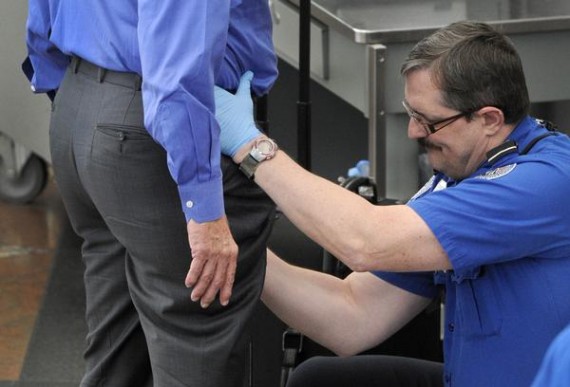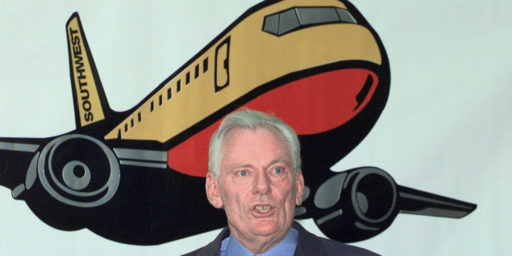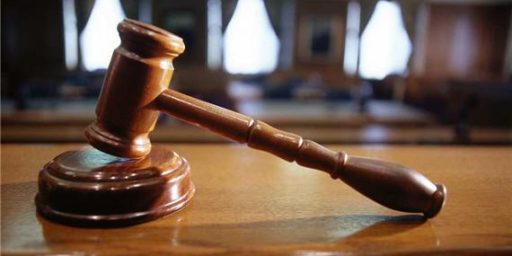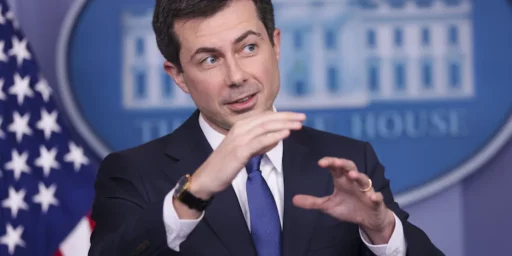TSA’s Security Through Bureaucracy
Security theater and the bureaucratic mentality.
Jacob Sullum at Reason’s Hit and Run blog takes note of the TSA’s inability to articulate a good reason for requiring laptops to be screened separately, regardless of their size, while allowing similarly-sized behemoth tablets to sail through inside luggage:
As usual, the most plausible explanation for the TSA’s policy comes from people outside the TSA. “Is it thicker than an inch, wider than a piece of paper, bluer than the sky?” says security expert Bruce Scheier. “Who cares? It’s all nonsense.” Robert Mann, an airline industry analyst, tells Richtel, “It’s a difference without a distinction, at least from a security standpoint.” An unnamed security expert says (in Richtel’s paraphrase) “the laptop rule is about appearances, giving people a sense that something is being done to protect them.” He calls it “security theater” (a term coined by Schneier).
While certainly security theater is a large aspect of the operation, the underlying impulse is almost certainly bureaucratic. Max Weber argued that one of the key characteristics of bureaucracies is their use of intentional, abstract, stable, exhaustive, and learnable rules, rather than case-by-case decision-making. Rules like “all laptops must be screened” or “everyone must remove their shoes” are easier to train people to apply and are more likely to be applied consistently and fairly than more complex rules that require either time-consuming measurements or the application of discretion. Presumably there is a minimum effective size for an explosive in a laptop that means that you probably couldn’t pack one in a netbook’s chassis, but a more complex and nuanced rule that is better adapted to that reality might reasonably lead to more delays (as passengers spend time arguing about the size of their laptops with TSA screeners) than a blanket rule, even if not sensible in its application to all situations.
Another similar example is the “liquid rule.” One suspects that if TSA had its druthers, no liquids at all would be allowed beyond the checkpoints, but there was sufficient lobbying from the airline industry and business travelers who don’t check bags to block a blanket ban, so we ended up with a compromise rule that makes little logical sense on the surface but again is easy to strictly apply; all the TSA screener really has to know is (a) the bottles can’t be very big, and you can usually read the numbers on them to figure out if they’re too big, and (b) they must all fit in a baggie no larger than “yay big.”
Similarly, exempting people from aspects of screening based on factors other than a detailed background check, such as having security screeners apply the judgments based on personal appearances and the like, might seem to be desirable but would potentially lead to abuses such as racial and ethnic profiling. The experience of limiting voter registration based on literacy and understanding tests in the South, for example, demonstrated that what on the surface what might appear to be a sensible rule that allows for discretion in its application could easily lead to widespread abuse to favor some individuals while discriminating against others.
All of this is not to say that TSA’s procedures are sensible or justified; they are, by and large, a product of the “security theater” instinct identified by Schneier. But given the risk aversion of the elected and appointed officials responsible for these policies in the first place (largely the result of a political calculus divorced from reasonable economic and social cost-benefit analysis), the proliferation of silly, inflexible rules is not only to be expected, but is in fact inevitable.







Discretion seems to have gradually disappeared from all areas of life, be one a TSA screener, doctor, judge, cashier, or what have you. Toeing the line becomes inevitable when failure to do so might easily mean losing one’s job or house or even freedom. Today we judge a man based on his worst minute. And we neither forgive nor forget. Why risk bending the rules and playing Mr Reasonable when today might be the day you screw up?
It never is not germane: “I’m from the government and I’m here to help.”
Of course it has. You can’t measure it.
Passenger air travel security is a reasonable concern. The reasons that hijackings have become so much less common than they were once upon a time include that the measures that have been put in place raise the transaction costs on hijacking to a level where your ordinary run-of-the-mill nutcase won’t do it any more. Does one, inflexible, monolithic system increase or decrease the costs to prospective hijackers? I think it decreases them which it seems to me is not what you’d want to do.
I don’t know about any of that, I just want my confiscated snow globes back (which were filled with water, as any cheap spectrometer would tell you).
9/11 itself was probably the biggest deterrent to hijackers. It used to be that the passengers had a reasonable assumption that they would survive a hijacking. Not anymore. Passengers pay better attention to their surroundings and are more willing to take action in their own defense. Weren’t the underwear and shoe bombers caught by their fellow passengers after making it through security?
J-Dub has the best of it, right there. The reason hijacking really doesn’t happen anymore is two-fold: a locked cockpit, and the fact that the passengers will tackle and beat the shit out of you the second anything seems amiss. Those things have nothing to do with taking our shoes off or having our laptop in a separate bin. People now know that hijacking might mean death, and people are going to fight like a cornered animal if they think they are in that situation. The TSA is pure, unadulterated theatre/fiction/performance art to make people feel warm and squishy when flying.
If TSA had their way, you would go aboard the plane naked and after a body cavity search.
TSA is security theater and a jobs program for unemployable misfits. After sixty billion dollars over eight years they can’t cite one success. In two separate GAO tests in 2011, TSA failed to detect weapons 70% of the time while allowing 60% of the freight in the cargo-hold to go unscreened. They confiscate items their website says are allowed but five of their screeners were caught smuggling drugs through security.
It’s also pretty creepy that the wholesale sexual assault of groping women and children is being sponsored by a blatantly gay woman. Napolitano claims empathy for the breast cancer victims being felt up at the checkpoint but she conveniently doesn’t have to endure it, although she may enjoy watching.
Based on the $8.1 Billion TSA budget and 712 million screenings, each one costs $11.38. Since the security fee is only $2.50 the other $8.88 is taxpayer funded whether they fly or not. So those of us who have stopped or heavily reduced our air travel are forced to pay for TSA despite being driven away from flying by them. Since this security circus is free to the airlines, subsidizing the industry with free security to the tune of $4.8B per year, they will continue to accept all of the security antics that TSA dreams up.
Currently there is no pressure to make TSA efficient or effective and the bottomless taxpayer pocket will allow TSA to continue to expand ad nauseum. If those who still fly want all of this intrusive security them make them pay for it and leave the rest of us alone.
This agency is a national disgrace and the lack of responsible management enables many abuses, crimes and failures to continue to occur. TSA is too broken to be reformed and must be replaced with something that actually works.